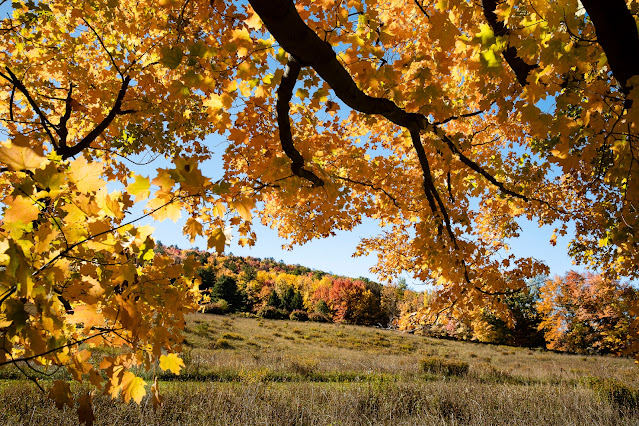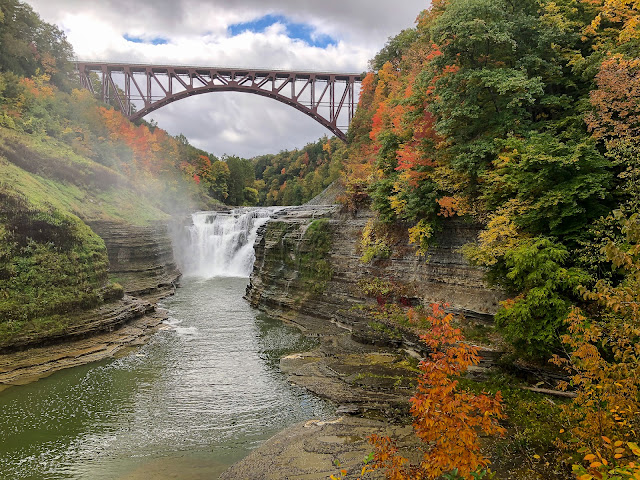Autumn can be a visually exciting time for photography, or not. Sometimes it all comes together and it only takes a cell phone to create a beautiful image. Other times, I find it hard to get excited. This is the Upper Falls of the Genesee River in Letchworth State Park. It is only faintly edited with no cropping at all.
This was almost too easy. More often, autumn photos come out with some good content surrounded by "blah". Rather then concentrate on the negative, my goal is to identify the plusses. Here's a quote that I've learned from:
Everything in the picture space either helps or hurts the image.
There's nothing neutral. Tony Sweet, Nikon Explorer of Light
For the above image, I chose to stand where the red sumac on the lower right corner of the frame grabbed the eye and began my eye's movement into the scene. Next, I found level by looking at the vertical trusses in the railroad bridge. The train track is angled so the right side is more lower in the view. Finally, the colors are real and not exaggerated as is so often done in autumn. (Don't do that! It only makes it worse.)
So, I find myself wandering about looking for scenes that contain only positive elements and avoid the boring. It's tough to avoid diluting the image with "nothing".
I am going to follow a story line like a writer. This helps me cull the "boring". The image at right sets the scene. Let's begin a walk in a nature preserve. It is Plymouth Woods near my home. When Dr. Grant purchased this woodland for a retreat decades ago, he found an abandoned Plymouth sedan. The photo says "autumn" and tells you the origin of the name. It's enough.
Now, we begin our walk. It's a welcoming scene, and the beech
leaves in the lower right quadrant begin your travel. Take out the
beech leaves and it is unsure where to begin. It doesn't have to be a
great image to begin the story of your explore on an autumn morning.
Just up the road, a stone wall appears on the north boundary marking a farmer's hard work a long time ago.
My eye begins the trip at the stone wall and continues to the white birch tree surrounded by gold and rust scenery. I am enjoying my morning walk and seeing some lovely settings. Let's look even closer. That's a key.
The leaves are giving in to overnight freezes. Just like in a movie scene, I am going from images that describe the setting to close-ups of the actors.
Not every fall image is a blast of rich colors. There are other stories. I come upon many ant hills made by Allegheny mound ants (Formica exsectoides).

Yes, I purposely located the flower in the left corner to get your attention.
The colony can exist for many decades as it slowly builds the mound. They
excrete formic acid around the edge of the mound and no plants
intrude. Over time, the mound can engulf any stray tree that
falls on the mound. This is a story about a walk in the forest, and the ants don't need to be always set in splashy colors.
It's been a good explore. Let's turn around and head back. Going in the other direction, the woods looks different and I see things that are new. I didn't see this before.
It's been a good explore though a golden woods. Here's a pair of big oaks that were probably a quarter of this size when Dr. Grant entered Plymouth Woods. They will continue to grow just like his gift to the Finger Lakes Land Trust.
As you view my images, I hope you will see that there is little that is neutral or negative in each. It's tough to follow this practice but over time it has reduced my sense of failure with my fall images. And, I have be able to go beyond looking to seeing.
Paul Schmitt



















